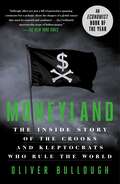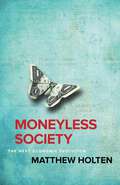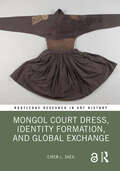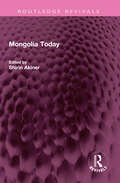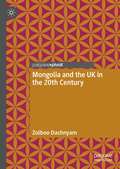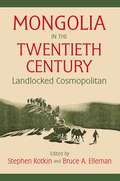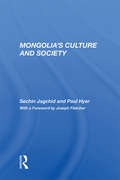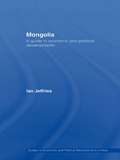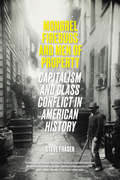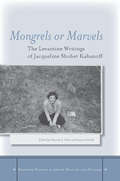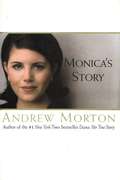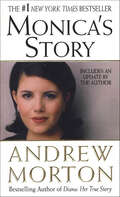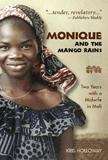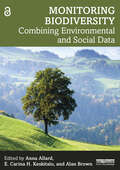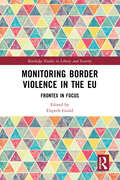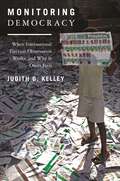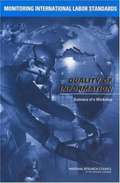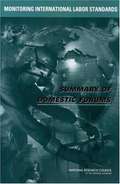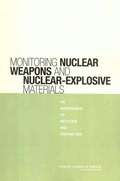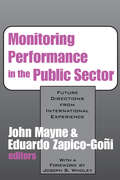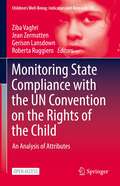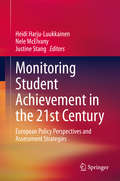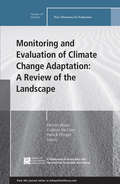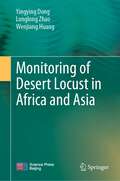- Table View
- List View
Moneyland: The Inside Story of the Crooks and Kleptocrats Who Rule the World
by Oliver BulloughInc.com 5 Business Thrillers to Read on the Beach This Summer * Amazon Best Book of the Month - Nonfiction * An Economist Book of the Year * The Sunday Times Business Book of the Year"If you want to know why international crooks and their eminently respectable financial advisors walk tall and only the little people pay taxes, this is the ideal book for you. Every politician and moneyman on the planet should read it, but they won't because it's actually about them." —John le Carré, author of A Legacy of Spies An investigative journalist's deep dive into the corrupt workings of the world's kleptocrats.From ruined towns on the edge of Siberia, to Bond-villain lairs in London and Manhattan, something has gone wrong. Kleptocracies, governments run by corrupt leaders that prosper at the expense of their people, are on the rise. Once upon a time, if an official stole money, there wasn't much he could do with it. He could buy himself a new car or build himself a nice house or give it to his friends and family, but that was about it. If he kept stealing, the money would just pile up in his house until he had no rooms left to put it in, or it was eaten by mice. And then some bankers had a bright idea. Join the investigative journalist Oliver Bullough on a journey into Moneyland—the secret country of the lawless, stateless superrich. Learn how the institutions of Europe and the United States have become money-laundering operations, attacking the foundations of many of the world's most stable countries. Meet the kleptocrats. Meet their awful children. And find out how heroic activists around the world are fighting back. This is the story of wealth and power in the 21st century. It isn't too late to change it.
Moneyless Society: The Next Economic Evolution
by Matthew HoltenThe evidence is all around us: Humans are squandering natural resources and destroying the environment. There is no real debate about climate change. And with an ever-widening wealth gap, inequality is destabilizing many regions and worsening famine, disease, and civil unrest. <p><p>We must change, fast—and yet we hesitate. <p><p>Moneyless Society: The Next Economic Evolution explores how capitalism throttles Earth’s capacity to sustain life and undermines our deep longing to live in peace and prosperity. Fortunately, it also provides a blueprint for innovative thinking and new structures to replace our outmoded monetary system. In short, Moneyless Society illuminates just how much our lives and those of future generations could improve with a new kind of freedom: freedom from money. <p><p>We are at a crossroads: we can choose abundance, community, and prosperity, or we can continue down the path toward collapse. The choice is ours.
Mongol Court Dress, Identity Formation, and Global Exchange (Routledge Research in Art History)
by Eiren L. SheaThe Mongol period (1206-1368) marked a major turning point of exchange – culturally, politically, and artistically – across Eurasia. The wide-ranging international exchange that occurred during the Mongol period is most apparent visually through the inclusion of Mongol motifs in textile, paintings, ceramics, and metalwork, among other media. Eiren Shea investigates how a group of newly-confederated tribes from the steppe conquered the most sophisticated societies in existence in less than a century, creating a courtly idiom that permanently changed the aesthetics of China and whose echoes were felt across Central Asia, the Middle East, and even Europe. This book will be of interest to scholars in art history, fashion design, and Asian studies.
Mongolia Today (Routledge Revivals)
by Shirin AkinerFirst published in 1991 Mongolia Today presents a collection of essays by leading scholars in the field and gives important insights into the economic, political, legal and military systems of Mongolia. The Mongolian People's Republic, formerly known as ‘Outer Mongolia’, is three times the size of France but has population of just two million. Sandwiched between Russia and China, this remote heartland of Asia has long been one of the most inaccessible places in the world, its isolation preserved by political as well as geographical barriers. The modern history of Mongolia has been dominated by its two great neighbours: strong economic and political ties with the erstwhile Soviet Union and problematic relations with China. Relations with the West have been slow to develop. Post-cold war, Mongolia is willing to explore new relationships with other parts of the world and transform this once isolated land into a trading partner of international potential. This is an essential read for scholars and researchers of Central Asian studies, Asian politics, and Chinese studies.
Mongolia and the UK in the 20th Century
by Zolboo DashnyamThis book explores the history of Mongolia's relations with external powers via the prism of the relationship with the UK, drawing on archival documents and other historical resources in different languages such as Russian, Chinese and Mongolian. From the early history of the Mongolian state as part of the socialist alliance, Mongolia has had relations with the UK, which was the first western nation to recognize Mongolian independence in 1963. The evolving political situation in Mongolia and the world is here refracted through the relationship with the UK. Further, it introduces readers to the cultural and ideological differences between Mongolian foreign relations belong to different historical periods. This book will be of interest to scholars of Asia, of the post-socialist world, and of the role of the UK in the world.
Mongolia in the Twentieth Century
by Stephen Kotkin Bruce Allen EllemanThe remote vastness of Mongolia has remained somewhat of a mystery to most Westerners - no less so in the 20th century. Homeland of the legendary conqueror Chingiz Khan, in modern times Mongolia itself has been the object of imperial rivalry. For most of the 20th century it was under Soviet domination. Mikhail Gorbachev began the withdrawal of Soviet troops from Mongolia in 1989, a process completed in 1992. By 1996 a coalition of opposition parties triumphed in national elections, and Mongolia launched itself on a new course. It is perhaps the most intriguing of the post-community "transition" societies. This volume examines Mongol history over the past century, embracing not only Mongolia proper but also Mongol communities in Russia and China. Contributions, based on new archival research and the latest fieldwork, are from the world's top experts in the field - including four authors from Mongolia and others from Japan, Russia, Taiwan, Great Britain and the United States. Stephen Kotkin's introductory chapter is an overview of Mongol studies. The essays in part 1 examine Sino-Russian competition over Outer Mongolia. Part 2 looks at international diplomacy in Mongolia, including the role of Japan. Part 3 focuses on contemporary issues ranging from economic and cultural change to emergent elites. A concluding essay surveys Mongolian foreign policy.
Mongolia's Culture And Society
by Sechin JagchidThis book describes nomadic life and culture in Mongolia depicting the patterns of the Ch'ing period (1644-1912), in which all the Mongols lived under the administration and control of the Chinese empire. It explains the patterns of the subsequent revolutionary period which altered the life of them.
Mongolia: A Guide to Economic and Political Developments (Guides to Economic and Political Developments in Asia)
by Ian JeffriesWith Mongolia fast becoming a significant exporter of minerals and raw materials, this book provides a full account of political and economic events in this important country. It focuses on the period since the establishment of the Soviet-backed Mongolian People’s Republic in 1924 and the transition towards a democratic free market system since the collapse of the Soviet Union. Covering key topics in Mongolia’s recent development, the book looks at: economic and political reform process the role of the private sector foreign aid trade and investment the attempts to tackle pressing issues such as growth, inflation, unemployment, poverty, problems of climate and weather, and pollution. This book is an important resource for anyone seeking to understand this fascinating country’s affairs.
Mongrel Firebugs and Men of Property: Capitalism and Class Conflict in American History
by Steve FraserA collection of essays on class politics in AmericaIn popular retellings of American history, capitalism generally doesn’t feature much as part of the founding or development of the nation. Instead, it is alluded to in figurative terms as opportunity, entrepreneurial vigor, material abundance, and the seven-league boots of manifest destiny. In this collection of essays, Steve Fraser, the preeminent historian of American capitalism, sets the record straight, rewriting the arc of the American saga with class conflict center stage and mounting a serious challenge to the consoling fantasy of American exceptionalism. From the colonial era to Trump, Fraser recovers the repressed history of debtors’ prisons and disaster capitalism, of confidence men and the reserve armies of the unemployed. In language that is dynamic and compelling, he demonstrates that class is a fundamental feature of American political life and provides essential intellectual tools for a shrew reading of American history.
Mongrels or Marvels
by Deborah A. Starr Sasson SomekhThe writings of Jacqueline Shohet Kahanoff (1917-1979) offer a refreshing reassessment of Arab-Jewish relations in the Middle East. A member of the bourgeois Jewish community in Cairo, Kahanoff grew up in a time of coexistence. She spent the years of World War II in New York City, where she launched her writing career with publications in prominent American journals. Kahanoff later settled in Israel, where she became a noted cultural and literary critic. Mongrels or Marvelsoffers Kahanoff's most influential and engaging writings, selected from essays and works of fiction that anticipate contemporary concerns about cultural integration in immigrant societies. Confronted with the breakdown of cosmopolitan Egyptian society, and the stereotypes she encountered as a Jew from the Arab world, she developed a social model, Levantinism, that embraces the idea of a pluralist, multicultural society and counters the prevailing attitudes and identity politics in the Middle East with the possibility of mutual respect and acceptance.
Monica's Story
by Andrew Morton"The girl who caught the eye of President Bill Clinton, a man of acknowledged sexual charisma and more than twice her age, is a person of endless contrasts: sure of her own mind yet unsure of herself; possessed of a high sense of entitlement but a low sense of self-worth; a girl with a fierce and sometimes perverse loyalty to others but little regard for her own survival. " -From the Forward
Monica's Story
by Andrew MortonGo beyond the headlines of the Clinton-Lewinsky scandal and revisit the story of Monica Lewinsky in this authorized biography from Andrew Morton, the basis for the FX miniseries Impeachment.Monica Lewinsky. You know her name, you know her face, and you think you know her story: the pretty young intern who began an illicit affair with the President of the United States-- a liaison that ignited an unprecedented political scandal and found Bill Clinton as the second U.S. president to ever be impeached. But there is much more to the Monica Lewinsky story than just that. Andrew Morton, author of the #1 New York Times bestseller, Diana: Her True Story, takes you behind the headlines and the sound bites to discover the real Monica Lewinsky, a woman as interesting, intelligent, and misunderstood as they come.Read Monica's Story and you'll discover:* How a difficult childhood shaped Monica's tumultuous adult romances* Her relationship with Bill Clinton: how she saw a side to him few know-- and why she sometimes still missed her "Handsome"* The betrayal by Linda Tripp-- and how Monica's trusting nature snared her in Tripp's treacherous web* The horror of Kenneth Starr's exhaustive and intrusive inquiry-- how it affected her and her family, and how it still haunts her* What Monica's hopes were, in the wake of the scandal, from career plans, to marrying, and family life.* And much, much moreWith sixteen pages of photographs.
Monique and the Mango Rains: Two Years With A Midwife in Mali
by Kris Holloway John BidwellMonique and the Mango Rains is the compelling story of a rare friendship between a young Peace Corps volunteer and a midwife who became a legend. Monique Dembele saved lives and dispensed hope in a place where childbirth is a life-and-death matter. This book tells of her unquenchable passion to better the lives of women and children in the face of poverty, unhappy marriages, and endless backbreaking work. Monique's buoyant humor and willingness to defy tradition were uniquely hers. In the course of this deeply personal narrative, as readers immerse themselves in the rhythms of West African village life, they come to know Monique as friend, mother, and inspired woman.
Monitoring Biodiversity: Combining Environmental and Social Data
by Alan Brown Anna Allard Keskitalo, E. Carina H.This book is an exciting reappraisal of the role and practice of biodiversity monitoring, showing how new technologies and software applications are rapidly maturing and can both complement and maintain continuity with the best practice in traditional field skills. Environmental monitoring is a key component in a large number of national programmes and constitutes an important aspect of understanding environmental change and supporting policy development. Taking an interdisciplinary approach, Monitoring Biodiversity begins by discussing monitoring as an established field and examines the various budgetary and technological challenges. It examines different methodologies, the variation between countries, and the design features relevant to understanding monitoring systems created for new policy goals or different funding situations. The huge variety of methods revealed across 18 chapters, which vary from statistical designs to remote sensing, interviews, surveys, and new ways of stacking and combining data and thematic information for visualization and modelling, underlines just how mature and multifaceted the modern practice of monitoring can be. It concludes with several problem-based chapters that discuss the design and implementation of environmental monitoring in specific scenarios such as urban and aquatic areas. All chapters include key messages, study questions, and further reading. With a focus on Europe but with international relevance, Monitoring Biodiversity will be an essential resource for students at all levels of environmental monitoring, assessment, and management.
Monitoring Border Violence in the EU: Frontex in Focus (Routledge Studies in Liberty and Security)
by Elspeth GuildThis book examines EU external border violence and the role of Frontex, and how it can be made legally and politically accountable for these incidents. The volume sets out what the international standards are for monitoring border violence and how monitors’ independence must be guaranteed and where these standards come from. The book provides realistic options to resolve the crisis by focusing on how effective and independent border monitoring can ensure better human rights compliance at EU external borders. At the centre of the book is the question: how can we achieve effective monitoring of border police, including Frontex, by competent and independent state authorities which have as a mission human rights implementation? The goal of the book is to examine how states can prevent and investigate allegations of such violence and diminish the apparent impunity of those border police who engage in it. This book will be of interest to students of EU policy, law, migration and refugee studies and International Relations.
Monitoring Democracy: When International Election Observation Works, and Why It Often Fails
by Judith G. KelleyIn recent decades, governments and NGOs--in an effort to promote democracy, freedom, fairness, and stability throughout the world--have organized teams of observers to monitor elections in a variety of countries. But when more organizations join the practice without uniform standards, are assessments reliable? When politicians nonetheless cheat and monitors must return to countries even after two decades of engagement, what is accomplished? Monitoring Democracy argues that the practice of international election monitoring is broken, but still worth fixing. By analyzing the evolving interaction between domestic and international politics, Judith Kelley refutes prevailing arguments that international efforts cannot curb government behavior and that democratization is entirely a domestic process. Yet, she also shows that democracy promotion efforts are deficient and that outside actors often have no power and sometimes even do harm. Analyzing original data on over 600 monitoring missions and 1,300 elections, Kelley grounds her investigation in solid historical context as well as studies of long-term developments over several elections in fifteen countries. She pinpoints the weaknesses of international election monitoring and looks at how practitioners and policymakers might help to improve them.
Monitoring International Labor Standards: International Perspectives
by Crispin Rigby National Research Council (U.S) StaffA report on Monitoring International Labor Standards
Monitoring International Labor Standards: Quality Of Information
by Margaret Hilton National Research Council (U.S.), Policy and Global Affairs Staff National Research Council (U.S.), Division of Behavioral and Social Sciences and Education Staff National Academies (U.S.), Committee on Monitoring International Labor Standards StaffThe National Academies Press (NAP)--publisher for the National Academies--publishes more than 200 books a year offering the most authoritative views, definitive information, and groundbreaking recommendations on a wide range of topics in science, engineering, and health. Our books are unique in that they are authored by the nation's leading experts in every scientific field.
Monitoring International Labor Standards: Summary of Domestic Forums
by Roger G. McelrathSince 1943, Recommended Dietary Allowances (RDAs) has been recognized as the most authoritative source of information on nutrient levels for healthy people. Since publication of the 10th edition in 1989, there has been rising awareness of the impact of nutrition on chronic disease. In light of new research findings and a growing public focus on nutrition and health, the expert panel responsible for formulating RDAs reviewed and revised its approach -- the result: Dietary Reference Intakes. This new series of references greatly extends the scope and application of previous nutrient guidelines. The first volume includes calcium, magnesium, phosphorus, vitamin D, and fluoride. For each nutrient the committee presents what is known about how the nutrient functions in the human body, which factors (caffeine or exercise, for example) may affect how it works, and how the nutrient may be related to chronic disease. Based on analysis of nutrient metabolism in humans and data on intakes in the U. S. population, the committee recommends intakes for each age -- from the first days of life through childhood, sexual maturity, midlife, and the later years. Recommendations for pregnancy and lactation also are made, and the book identifies when intake of a nutrient may be too much. Dietary Reference Intakes provides three sets of measures for each nutrient in the volume: -- Estimated Average Requirements (EARs), estimated for age and gender categories. -- Recommend
Monitoring Nuclear Weapons And Nuclear-explosive Materials
by National Academy of Sciences of the National AcademiesIn this study, CISAC tackles the technical dimensions of a longstanding controversy: To what extent could existing and plausibly attainable measures for transparency and monitoring make possible the verification of all nuclear weapons—strategic and nonstrategic, deployed and nondeployed—plus the nuclear-explosive components and materials that are their essential ingredients? The committee’s assessment of the technical and organizational possibilities suggests a more optimistic conclusion than most of those concerned with these issues might have expected.
Monitoring Performance in the Public Sector: Future Directions from International Experience (Comparative Policy Evaluation Ser.)
by John Winston MayneA host of promising public sector reform efforts are underway throughout the world. In governments challenged by budget deficits and declining public trust, these reform efforts seek to improve policy decisions and public management. Along the way, program efficiency and effectiveness help rebuild public confidence in government. Whether through regular measurement of program inputs, activities, and outcomes, or through episodic one-shot studies, performance monitoring plays a central role in the most important current reform efforts. Monitoring Performance in the Public Sector, now available in paperback, is based on experiences derived from comparative analysis in different countries. It explains why there is interest in perfor!mance monitoring in a given setting, why it has failed or created uncertainties, and identifies criteria for improving its design and use.One of the challenges this book offers is the need to consider dimensions of performance beyond the traditional ones of economy, efficiency, and effectiveness. With an increasingly diverse, interdependent, and uncertain public sector environment, for some stakeholders meeting objectives fixed some time ago may not be as important as the capacity to adapt to current and future change. In this vein, the contributors address a number of themes: the criti!cal importance of organizational support for performance monitoring and making it consistent with the organizational culture, the need for active and effective leadership in defining criteria and implementing practical performance monitoring, the value of linking ongoing measurement with more than the traditional, strictly quantitative aspects of public sector performance.As we gain experience with performance monitoring and its uses, such systems should become more cost effective over time. This book will be of deep interest to public managers, government officials, economists, and organization theorists, and useful in courses on p
Monitoring State Compliance with the UN Convention on the Rights of the Child: An Analysis of Attributes (Children’s Well-Being: Indicators and Research #25)
by Ziba Vaghri Jean Zermatten Gerison Lansdown Roberta RuggieroThis open access book presents a discussion on human rights-based attributes for each article pertinent to the substantive rights of children, as defined in the United Nations Convention on the Rights of the Child (UNCRC). It provides the reader with a unique and clear overview of the scope and core content of the articles, together with an analysis of the latest jurisprudence of the UN Committee on the Rights of the Child. For each article of the UNCRC, the authors explore the nature and scope of corresponding State obligations, and identify the main features that need to be taken into consideration when assessing a State’s progressive implementation of the UNCRC. This analysis considers which aspects of a given right are most important to track, in order to monitor States' implementation of any given right, and whether there is any resultant change in the lives of children. This approach transforms the narrative of legal international standards concerning a given right into a set of characteristics that ensure no aspect of said right is overlooked. The book develops a clear and comprehensive understanding of the UNCRC that can be used as an introduction to the rights and principles it contains, and to identify directions for future policy and strategy development in compliance with the UNCRC. As such, it offers an invaluable reference guide for researchers and students in the field of childhood and children’s rights studies, as well as a wide range of professionals and organisations concerned with the subject.
Monitoring Student Achievement in the 21st Century: European Policy Perspectives and Assessment Strategies
by Heidi Harju-Luukkainen Nele McElvany Justine StangThis book draws together leading student assessment academics from across Europe exploring student monitoring policies and practices in a range of countries across 22 chapters. The chapters in the first part offer a broad overview on student assessment covering history and current status, aims and approaches as well as methodological challenges of international student assessment. The second part presents country specific chapters provide an in depth look examining country specific policy and practices and findings of national and/or international assessments. Findings are critically discussed and recommendations are made for further development of each country's assessment context. The book shows similarities and differences within the educational assessment landscape as well as complexity and similarities in assessment policy documents and strategies, Given the globalized world we live in today, this book fills a need in the higher educational context and is intended for for policy makers in different countries as well.
Monitoring and Evaluation of Climate Change Adaptation: New Directions for Evaluation, Number 147 (J-B PE Single Issue (Program) Evaluation)
by Patrick Pringle Dennis Bours Colleen McGinnMonitoring and evaluation (M&E) of climate change adaptation (CCA) poses an assortment of thorny methodological challenges. Individually, none are unique to CCA, but together they represent a very distinctive conundrum facing practitioners and policy makers. Adding to this complexity further, climate change may be global in nature but its impacts, and how we respond to them through adaptation efforts, cut across scales, sectors, and levels of intervention. As investments in climate adaptation increase, organizations are seeking to measure, assess and understand an array of adaptation initiatives, and derive learnings to inform policy and praxis. This issue presents findings from many of the most important contemporary CCA program evaluation research initiatives. The chapters represent the most coherent and current collection of CCA M&E research in this emerging and important field, written by many of its leading experts. Filled with examples and insights in formulating coherent responses to methodological challenges, it will be of interest to M&E scholars and practitioners globally.This is the 147th issue in the New Directions for Evaluation series from Jossey-Bass. It is an official publication of the American Evaluation Association.
Monitoring of Desert Locust in Africa and Asia
by Yingying Dong Longlong Zhao Wenjiang HuangThis book deals with the topic on remote sensing monitoring of desert locust in Africa and Asia. Remote sensing monitoring of the occurrence and damage of desert locust is conducted by integrating cutting-edge technologies and methods in cross-disciplinary fields in remote sensing science, geographic information science, agronomy, plant protection, agricultural meteorology, mathematics, and computer science. The main contents include spatio-temporal data analysis and processing, desert locust breeding areas monitoring, pest migration path analysis and damage monitoring. Moreover, a desert locust remote sensing monitoring system is constructed and applied in the region of Africa and Asia countries. This book not only provides technical reference for remote sensing monitoring and application of desert locust but also serves as a research reference for scholars and graduate students engaged in agricultural remote sensing, agricultural information technology, plant protection and other related field. It will help to improve remote sensing monitoring and application of desert locust.
